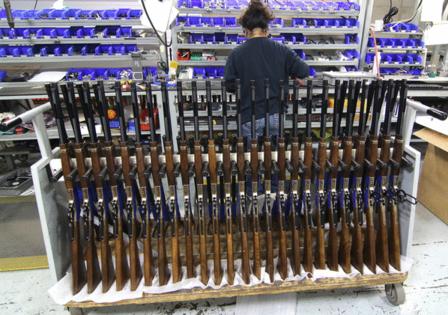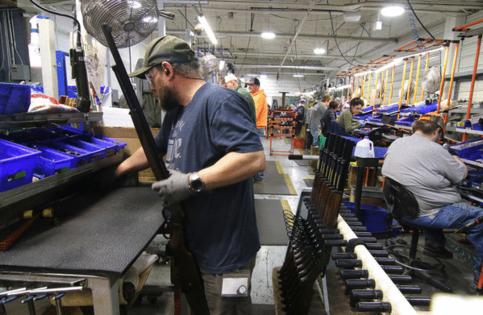Made in America: Gunmaker bets big on western Wisconsin
Published in Outdoors
RICE LAKE, Wis. — Lever-action rifles, revolvers, gun barrels, trigger assemblies and other firearm components lace the sprawling manufacturing floor here at Henry Repeating Arms, a leading U.S. gunmaker with ties to Minnesota.
Hundreds of skilled plant workers, many sporting hunting apparel, tattoos or merch from the Green Bay Packers, make parts and assemble them at a striking pace: as many as 425,000 a year.
Located less than 80 miles northeast of the Twin Cities, the company has climbed into the top tier of U.S. gun producers, anchored by small-caliber, lever-action rifles with a throwback look.
Earlier this year, it turned heads in the industry by closing its flagship plant in Bayonne, N.J., and centralizing all manufacturing in Rice Lake and nearby Ladysmith. The influx of new jobs has boosted the company’s Wisconsin workforce to 675 employees, including an in-house research and design team intent on diversifying the product line.
“Our brand is growing and Wisconsin has welcomed us with open arms,” said company President Andy Wickstrom, a lifelong Wisconsin deer hunter. “There’s going to be new things from Henry.”
Wickstrom, who studied engineering and played football at the University of Wisconsin-Stout in Menomonie, said Henry hasn’t escaped the national slowdown in gun sales that followed record demand during the pandemic. Company sales fell about 5% last year and are likely to languish again this year. Still, in a 2023 listing of top American gun manufacturers, Henry Repeating Arms ranked sixth in total firearms produced, up three places from the previous year. In the past decade, Henry’s employment in Rice Lake and Ladysmith has more than quadrupled.
“Hunt with a Henry” is one of the company’s mottos and it offers an array of options for hunting deer or other big game, including a lever-action .308-caliber rifle.
Even more central to its drive to grow market share is the company’s long-held “Made in America” emphasis, aligning with President Trump’s “America First” economic messaging. The administration’s staunch defense of the Second Amendment, with no new threats of anti-gun legislation, is giving U.S. gun manufacturers comfort in making business decisions.
With an advertising slogan of “Made in America or Not Made at All,” Henry buys all parts and machinery from American companies, including several in Minnesota.
Chris Randall, an independent firearms reviewer in Iowa who runs a popular YouTube channel, grew up shooting a lever-action Henry rifle that his father gave to him. In several posts over the past few years, he’s documented renewed interest in that category of rifles. Last year, for instance, Smith & Wesson introduced its first lever-action rifle in 170 years, and other manufacturers have also entered the category with new products.
“They are one of the coolest looking guns out there,” Randall said in one of his YouTube episodes. Modern versions of the sleek, old-fashioned American guns also provide versatility, accuracy, reliability and a wide range of calibers, he added.
Henry’s stable of pitchmen has included conservative political commentator Sean Hannity, and Henry has worked with NASCAR by sponsoring a 180-mile race for several years at Road America in Wisconsin’s Sheboygan County.
Wickstrom said Henry’s decision to leave New Jersey was weighty but unavoidable. Company founder and CEO Anthony Imperato lives in lower Manhattan. He grew up in a New York City family involved in the gun business and police supplies. Henry’s first rifles were shipped from a small factory in Brooklyn in March 1997. Operating from the East Coast was a big part of its identity.
Wickstrom said New Jersey’s heavy manufacturing regulations were making it difficult to do business. Also, gun ownership in politically blue New Jersey is low — a trait that carried into the workforce.
By comparison, Wickstrom said, Wisconsin charges lower business taxes and imposes fewer regulations. It’s a gun-friendly purple state where hunting and gun ownership are entrenched in the culture, he said, adding that Wisconsin employees have a passion for craftsmanship. Each finished product is test-fired five times in a special room on the factory floor before it’s packaged.
The company ended up in Wisconsin after buying the Rice Lake manufacturing facility of one of its suppliers in 2006. Wickstrom was a manager at the plant and switched companies to work for Henry. By 2013, Wickstrom was overseeing full assembly of rifles, not just parts.
The company’s bread-and-butter product is the small-caliber “Golden Boy,” a lever action rifle with an Old West flair. It has a “brass-lite” receiver (the component that houses the trigger and “receives” the barrel and stock).
The Golden Boy is a modernized replica of America’s first lever-action repeating rifle, a gun introduced in 1860 by Benjamin Tyler Henry, the company’s namesake. Originally, the gun’s “rapid” firing provided a battlefield advantage to soldiers in the American Civil War.
“It has a throwback look with modern performance,” Wickstrom said.
At Henry, Golden Boy models belong to an expansive line of other .22-caliber, .17-caliber and .22 magnum caliber rifles marketed for varmint control. A portion of the Golden Boys are made as special tribute models for military veterans, police, first responders and for other commemorative purposes.
Although Henry’s product line isn’t exclusive to hunting, the company prides itself on supporting wildlife habitat conservation. For the company’s 25th anniversary, it donated a total of $100,000 to Pheasants Forever, Rocky Mountain Elk Foundation and Ducks Unlimited. At the same time, it donated $225,000 to eight organizations that support police and first responders.
©2025 The Minnesota Star Tribune. Visit startribune.com. Distributed by Tribune Content Agency, LLC










Comments